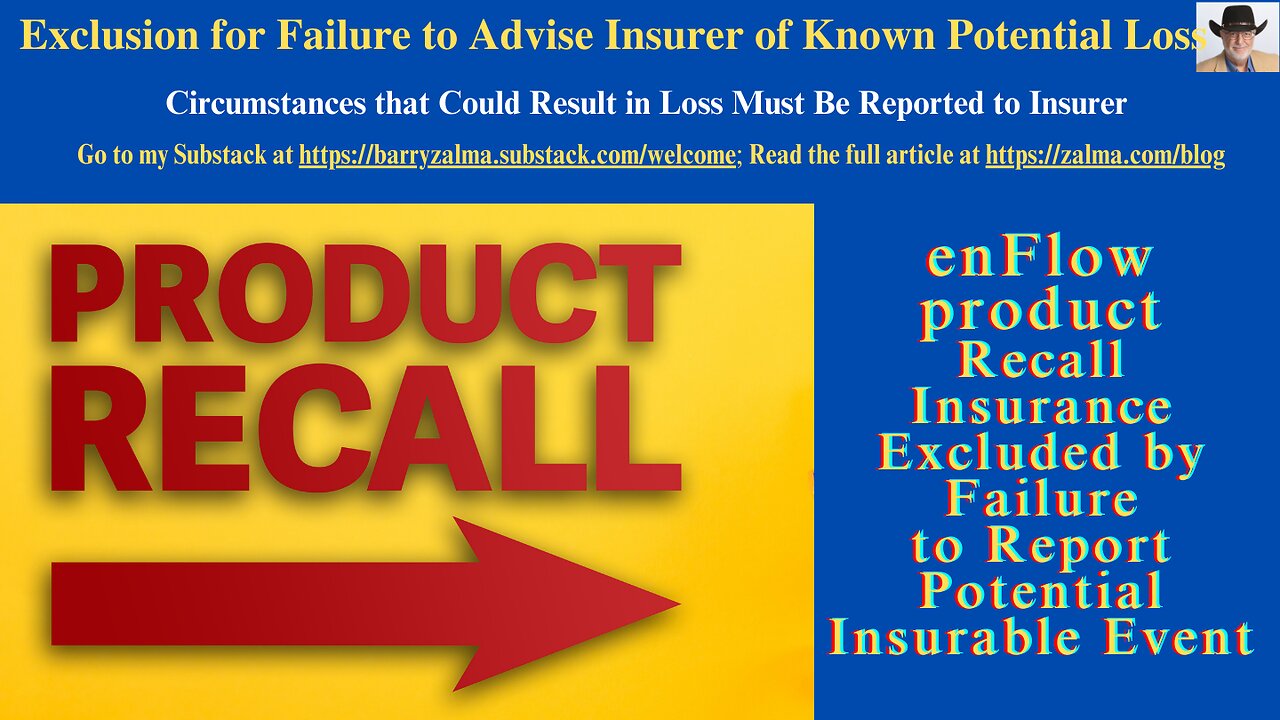Premium Only Content

Exclusion for Failure to Advise Insurer of Known Potential Loss
CircuThe Supreme Court, New York County (Barry R. Ostrager, J.), entered a judgment which denied plaintiffs' motion for partial summary judgment as to liability for breach of contract and sought product recall insurance coverage under a set of policies issued to plaintiffs for the period of March 7, 2018 to March 7, 2019.
The order also and granted defendants' motions for summary judgment in part, to the extent of dismissing plaintiffs' second cause of action seeking liability for breach of contract and for coverage under a set of policies issued to plaintiffs for the period of March 7, 2019 to March 7, 2020.
In Vyaire Holding Company et al. v. Westchester Surplus Lines Insurance Company, et al, North American Capacity Insurance Company, 2024 NY Slip Op 00825, Appeal No. 1595, Index No. 652428/20, No. 2022-05619, Supreme Court of New York, First Department (February 15, 2024) the appellate division affirmed the trial court.
FACTS & PRIOR NOTICE EXCLUSION
Defendants issued consumer goods insurance policies on medical devices sold by plaintiffs (collectively, Vyaire). The Year One policy ended on March 7, 2019, at which point the Year Two policy began. Each policy was triggered by an "insured event" discovered in the policy period, provided that Vyaire gave written notice as soon as possible, no later than 30 days after discovery of the event. Additionally, the policies excluded coverage for pre-existing circumstances that Vyaire "knew of or should have known of, prior to the inception of this policy, that caused or could reasonably have been expected to cause... an 'insured event'."
The "Insured event" was defined as a" 'stock recovery,' market withdrawal or recall" of an insured product that would cause bodily injury or property damage. "Stock recovery" was defined by the policies but "market withdrawal" and "recall" were not.
THE PRODUCT
enFlow, a product insured under the policy, was first approved in 2006. By 2018, it was used in many different countries. Prior to March 2019, there were no reports of patient injury due to aluminum toxicity. In February 2018, however, Vyaire learned of a (then-unpublished) study indicating that enFlow may cause aluminum toxicity when used with a certain infusion. On February 6, 2019, Vyaire learned that the infusion did not contain malate. Rather, it contained lactate, which was commonly used in medical solutions.
In early March 2019, Vyaire learned that many hospitals in the United Kingdom had ceased using enFlow, and two EU regulatory agencies expressed their intentions to take regulatory action. As a result, on March 5, 2019, Vyaire decided to suspend enFlow use in the EU. On March 7, 2019, Vyaire began to file the paperwork for a withdrawal with the FDA. On March 11, 2019, Vyaire's testing revealed unacceptable levels of aluminum leaching with many different infusions. On March 12, 2019, Vyaire notified defendants that they were about to issue a world-wide recall of enFlow and gave notice as to "all responsive policies." On March 13, 2019, Vyaire issued a global recall notification.
ANALYSIS
The Supreme Court (trial court) properly determined that coverage for Year Two was excluded under the prior notice exclusion. The record established that by March 7, 2019 Vyaire knew or should have known about circumstances that could reasonably have been expected to cause an insured event.
The Supreme Court, therefore, correctly denied both motions for summary judgment as to the Year One policy.
To establish that it satisfied the notification requirement, however, Vyaire would have to prove that it discovered the event no earlier than February 10, 2019, and gave notice as soon as possible. Before March 2019, there were no reported injuries due to aluminum toxicity from enFlow, despite its frequent and widespread use. Moreover, no regulatory agency had yet indicated any intention to recall the product.
Yet, by that date, Vyaire had engaged in extensive communications with foreign regulatory agencies for approximately a year regarding enFlow's possible aluminum toxicity.
Vyaire had also conducted its own testing regarding aluminum leaching. Vyaire knew that an infusion containing lactate, not malate, leached potentially dangerous amounts of aluminum.
The competing claims raise issues of fact as to whether Vyaire had a reasonable belief, until at least February 10, 2019, that no insured event had occurred.
ZALMA OPINION
This case teaches that every insured of a liability insurance policy should always advise the insurers when it learns of a potential of a loss that would be an insurable event under the policy. Vyaire failed when it knew there was a potential problem with the product and the danger of injury to people using the product. Vyaire failed on one policy year and potentially failed on the earlier year which the court left for trial to determine whether Vyaire had a reasonable belief until 2/10/19 that no insured event had occurred. The problem and litigation could have been resolved by a prompt notice.
(c) 2024 Barry Zalma & ClaimSchool, Inc.
Please tell your friends and colleagues about this blog and the videos and let them subscribe to the blog and the videos.
Subscribe to my substack at https://barryzalma.substack.com/publish/post/107007808
Go to Newsbreak.com https://www.newsbreak.com/@c/1653419?s=01
Go to X @bzalma; Go to the podcast Zalma On Insurance at; Go to Barry Zalma videos at Rumble.com at https://rumble.com/c/c-262921; Go to Barry Zalma on YouTube- https://www.youtube.com/channel/UCysiZklEtxZsSF9DfC0Expg; Go to the Insurance Claims Library – http://zalma.com/blog/insurance-claims-library.
Please tell your friends and colleagues about this blog and the videos and let them subscribe to the blog and the videos.
Go to X @bzalma; Go to Newsbreak.com https://lnkd.in/g8azKc34; Subscribe to my substack at https://lnkd.in/gcZKhG6g
Go to the Insurance Claims Library – https://lnkd.in/gwEYkxD.mstances that Could Result in Loss Must be Reported to Insurer
-
 5:22:49
5:22:49
Drew Hernandez
14 hours agoDOGE EXPOSES $2 BILLION SCHEME LINKED TO STACEY ABRAMS?!
59.8K35 -
 1:27:59
1:27:59
Kim Iversen
9 hours agoRFK Jr Declares No More Cheetos on Welfare? | Yale Confirms Long Covid Is Actually Vaccine Injury!
82.9K101 -
 1:08:43
1:08:43
The Charlie Kirk Show
6 hours agoTHOUGHTCRIME Ep. 74 — Charlie's Campus Return? Robo-Butlers? Garden of American Heroes?
74.8K17 -
 1:09:53
1:09:53
Slightly Offensive
7 hours ago $5.86 earnedIs the US Headed for MORE WAR Under TRUMP? | Guest: Scott Horton
41.9K9 -
 58:29
58:29
The StoneZONE with Roger Stone
6 hours agoRoger Stone Hails Confirmation of Kash Patel, Trashes Schiff for Attacks On Patel | The StoneZONE
48.9K18 -
 48:44
48:44
Man in America
11 hours agoA MASSIVE Global Financial Reset Is Coming—Are You Ready?
37.6K7 -
 1:15:42
1:15:42
Precision Rifle Network
1 day agoS4E5 Guns & Grub - The Best Rifle Under $2000
59.5K6 -
 1:02:54
1:02:54
Glenn Greenwald
1 day agoSouth Korean Economist Ha-Joon Chang on the Economic World Order, Trump's Tariffs, China & More | SYSTEM UPDATE #410
83.7K48 -
 1:02:27
1:02:27
Donald Trump Jr.
12 hours agoBye Mitch, plus Kash confirmed, Interview with AJ Rice | Triggered Ep.218
130K73 -
 1:12:27
1:12:27
The Amber May Show
13 hours ago $3.12 earnedWomen Of Rumble 02-20-25
36K7